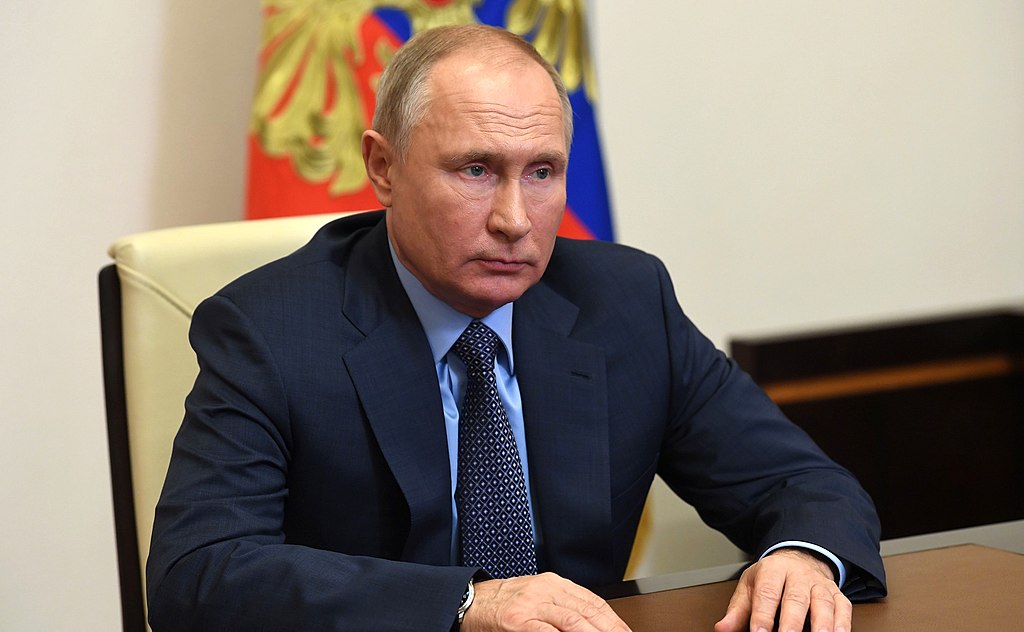A majority of US citizens across parties now condemn Moscow’s invasion of Ukraine and support the sanctions adopted by the Biden administration. However, talk of unanimity would be stretching it. The Republican Party is a case in point, as Donald Trump and a good number of his supporters continue to look up to Russian president Vladimir Putin.
How can we explain the autocrat’s enduring spell over the Republicans? And how might it impact upon the midterm elections due to take place in a few months’ time?
A moment of political unity in the US?
Prior to the invasion on 24 February, only 42% of Republicans sided with Ukraine in its longstanding conflict with Russia. In 2017, 49% even considered Russia an ally while 32% held a favourable opinion of Putin.
Now 58% of Republicans support Ukraine (compared to 57% of the general population), and approximately 6% favourably regard Putin. By comparison, Democrats’ support for Ukraine increased from 58% to 70% since the invasion.
Will the existence of a common enemy be enough to rebuild national unity around shared values, as was the case in the past? There are plenty of reasons to doubt it.
As of now, no US troops are involved in the war. This means no rally-round-the-flag moment for President Biden, whose approval rating has remained low (42%) after the country’s withdrawal from Afghanistan in August 2021. Republicans have seized every opportunity to accuse Joe Biden of being “weak” in the face of Putin, and of having done “too little, too late”. Above all, a month after the Russian invasion, voters seem more concerned about inflation, which they attribute more to the Biden administration’s economic policies (41%), than to the war in Ukraine and sanctions against Russia (24%).
Opinion by Jennifer Rubin: Even in war, the GOP’s search for ways to undermine Biden never ends https://t.co/hxuzdZltik
— The Washington Post (@washingtonpost) March 8, 2022
Fault lines within the Republican Party
Putin’s war has highlighted the tensions within the Republican Party between its nationalist and globalist factions.
Publicly, its leaders in both the Senate (Mitch McConnell) and House of Representatives (Kevin McCarthy) have condemned the invasion. That dance is more delicate for the nationalist wing, which has been soft on Russia and praised Putin as a strong leader.
Faced with the possibility of an embarrassing political fallout from the Russian invasion, the pro-Trump nationalist camp held an emergency meeting at a Washington hotel in late March to devise PR strategy on the war. To Joe Biden’s claim that the conflict represented a long-term struggle between “autocracy and democracy, freedom and repression”, it has countered that the war was created by the United States and NATO and has refused to condemn Putin.
Donald Trump has long had a soft spot for authoritarian strongmen, not least Putin. However, Trump’s warm words and enthusiastic tweets did not always translate into foreign policy. Note, for example, US opposition to the construction of a gas pipeline linking Russia to Germany, Nord Stream 2, and Republicans’ vote to send military aid to Ukraine in 2019.
Trump, however, has never stopped praising Putin, including after the invasion of Crimea in 2014. This is not least due to personal interests. Let us recall his 2019 attempt to force Ukrainian president Volodymyr Zelensky to investigate Joe Biden and his son Hunter by threatening to withhold delivery of US military aid – something that led to the first of Trump’s two impeachments.
On 23 February 2022, the former president still referred to Putin as “a genius”. Speaking to the conservative daily The Washington Examiner, he later expressed surprise at Russia’s invasion and said he thought Putin’s threats were a mere negotiating tactic.
Trump is only the tip of the iceberg, however. Many political and media figures on the far right of the Republican Party have supported Putin for years. Among them none are so forthright as the Fox News host Tucker Carlson.
I don't put much credibility into any MSM news station, however, Tucker Carlson just blew the Ukraine biolab story totally out of the water, a perfect lynching.
— Lorhainne Eckhart (@LEckhart) March 10, 2022
Tucker: Why are we funding this? https://t.co/xYmtNtRchi via @YouTube
In 2019, Carlson had already called to support Russia in its conflict with Ukraine. Even as Russian troops entered Ukraine in late February, he rhetorically asked his viewers why he should hate Putin. He has consistently provided airtime for Russian disinformation regarding Ukraine corruption and American biolabs. Not surprisingly, Russian state media outlets have been running Carlson’s clips and comments unedited.
Culture wars: Better Putin than the Left
The Republican Party has long advocated for a missionary and interventionist role of the United States in the world. Such a trend was particularly strong during the the two terms of Ronald Reagan (1980-1988), who strove to combat Soviet-backed pro-communist governments in Africa, Asia, and South America. In recent years, the party’s nationalist faction has prioritised cultural over democratic issues.
Pat Buchanan, the godfather of this culture war, initiated the movement at the end of the Cold War with his emphasis on “America First.”
Pat Buchanan takes on the Democrats at the Republican National Convention in 1992.
In the eyes of this new right, Putin is a hypermasculine, authoritarian figure defending traditional values in the face of the feminist, LGBTQ and Muslims zeitgeist; he’s seen as a redeemer of Western society in the face of religious decadence. In contrast, Joe Biden is viewed as feeble, and his every slouch, gaffe and stutter is portrayed as weakening the image of American nation.
The Christian right also sees Russia as an ally in its fight for a nostalgic and fantasized past. Franklin Graham, son of evangelical icon Pastor Billy Graham, cultivates close ties with Putin and Patriarch Kirill, the Russian Orthodox bishop who has argued in favour of “traditional family values” in Russia and elsewhere. For pro-Trump culture warriors, the true enemy is the American progressive left rather than the Russian dictator.
The Trumpian right comes out of Putinism unscathed
While 54% of Americans today believe that national public figures who express admiration for Vladimir Putin are unpatriotic, a majority (58%) also believe the Russian autocrat would not have invaded Ukraine if Donald Trump were president. The same Harvard-Harris poll of March 2022 shows voters prefer Donald Trump to either Joe Biden or Kamala Harris in a hypothetical presidential race in 2024.
Up to now, the pro-Putin rhetoric of Trump and his allies in the Republican party does not seem to carry political costs. While it is too early to bet on the future, we should not rule out a Republican Congress in 2023 and a White House in 2025 that may be much more conciliatory toward Putin, to the detriment of Europe and democratic values.
The stakes of the primaries, now taking place, and the upcoming midterm elections in November 2022 are profound. They will decide whether the Putin wing of the Republican Party wins or if the GOP returns to democratic principles.



 FxWirePro- Major Crypto levels and bias summary
FxWirePro- Major Crypto levels and bias summary 
































